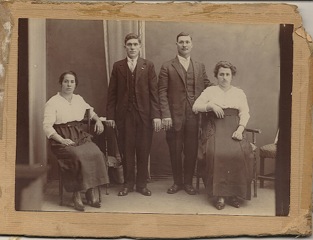
WTI Magazine #68 2015 September, 18
Author : Cookie Curci Translation by:
My grandfather was never a man of many words, but when he spoke we listened. Though his words were few they were filled with wisdom. He would often say to us: "Pray for the things you want, but work for the things you need". If grandpa said that phrase once, he said it a thousand times. Like many of his generation , who came to America during the great migration, grandpa was a man of deep faith, but he also realized that hard work would provide him and his family with the material things in life.
His work in the fields, in the factories and in the orchards of the valley was honest and fulfilling because it came forma a place of pure and clear devotion. Looking back now to a century ago I can visualize in my mind's eye the finale of my grandparent's long journey to America and how they sailed aboard ships that took them months to reach New York's port of entry.
I can feel my ancestor's joy and their sense of fear and expectations as they made their arrival past the gates of Ellis Island, and how they worried for their siblings that were forced to return to Italy because they were rejected by the health inspectors for having a small limp or deformity.
Grandma would often tell me of these days, of her sadness and separations and of her great hope for a better life and how the excitement of their journey far outweighed their fears. Apprehensions may have been there, but it was not upper most in their thoughts.
The expectations of journeys end made them oblivious to the enormous challenges that awaited them. First, and foremost, they would have to gain acceptance in a New World, which practiced beliefs and cultures different from their own. But the whispered promise of streets paved in gold was too overwhelming to ignore.
They would gladly face the unknown to find this golden opportunity. Soon enough, the immigrants would learn that all they had heard of the bountiful New World was not all true. Though they would discover that the streets of America were not paved in gold, they did find what they were looking for in precious opportunity. They would survive.
They etched out a living for themselves and moved into a 12-block area of San Jose south of First Street. It was a perfect location for housing the hopeful young immigrants. Despite their language barrier and unskilled labor they were able to find employment. They rolled up their sleeves and got to work and soon another of America's "Little Italy's" was created. City dwellers would refer to the community of immigrants by a number of names, some colorful, some unflattering, but I believe 'little Italy" to be the most accurate. The area served as home to many newly arrived ethnic groups of different cultures and backgrounds, but it was the Italian community that prevailed.
By 1910 hundreds of Italian Americans called this 12-block area of San Jose home. By 1916 the population of San Jose's little Italy soured. Residents of the settlement were proud of their meager homes and gardens and the area bloomed with pride. There was an abundance of fruit tree, vegetables and flower gardens surrounding each plot of land. Trees, laden with prunes, cherries and apricots bore testimony to the community's' flourishing lifestyle. It was no wonder that the grapes grew so large and fruit to unusual size and quality, most of the young immigrants had been schooled early on in life by their parents and their parents before them on the grafting, planting and pruning of fruit bearing trees. By the time a child was 10 years of age he, or she, knew all there was to know about vegetable gardening and fruit trees. They had to, it meant survival in the old county and now in the New World as well.



